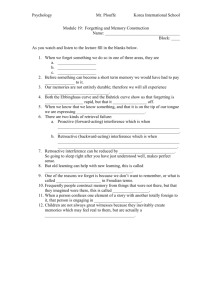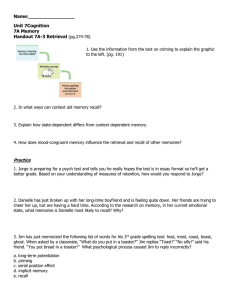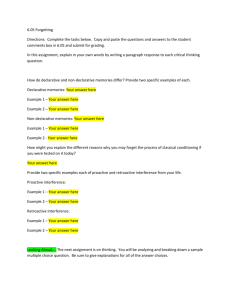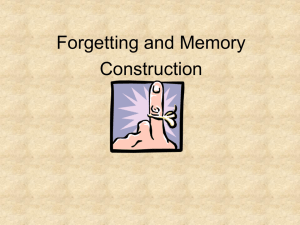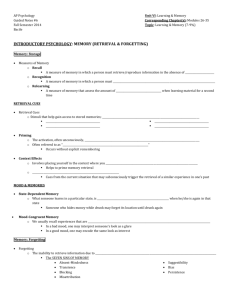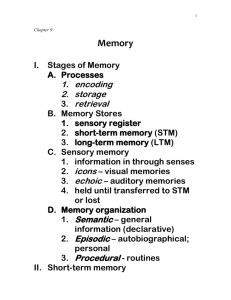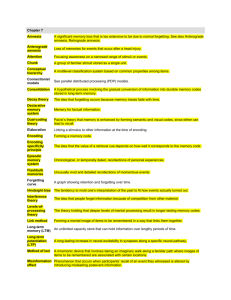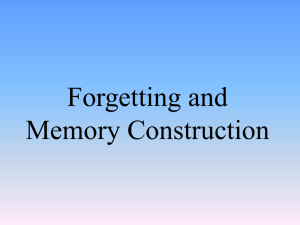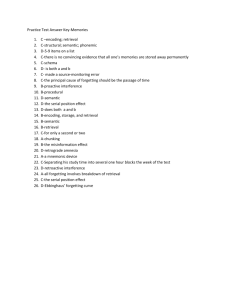Memory
advertisement
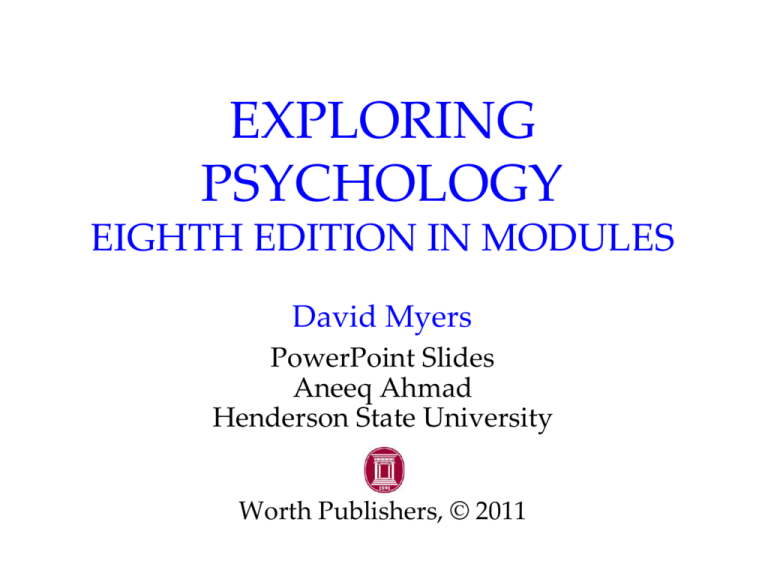
EXPLORING PSYCHOLOGY EIGHTH EDITION IN MODULES David Myers PowerPoint Slides Aneeq Ahmad Henderson State University Worth Publishers, © 2011 Memory 2 Forgetting, Memory Construction, and Improving Memory Module 21 3 Forgetting Encoding Failure Storage Decay Retrieval Failure CLOSE –UP: Retrieving Passwords 4 Memory Construction Misinformation and Imagination Effects Source Amnesia Children’s Eyewitness Recall Repressed or Constructed Memories of Abuse? Improving Memory 5 Forgetting An inability to retrieve information due to poor encoding, storage, or retrieval. Being able to forget information that is no longer useful is certainly a blessing. However, being unable to remember information we need can be frustrating and annoying. 6 Encoding Failure We cannot remember what we do not encode. 7 Storage Decay Poor durability of stored memories leads to their decay. Ebbinghaus showed this with his forgetting curve. 8 Retrieval Failure Although the information is retained in the memory store, it cannot be accessed. 9 Interference Learning some new information may disrupt retrieval of other information. Proactive interference occurs when something you learned earlier disrupts your recall of something you experience later. Retroactive interference occurs when learning something new makes it harder to recall something you learned earlier. 10 Retroactive Interference Sleep helps prevent retroactive interference because it minimizes the chance for interfering events. 11 Close-Up: Retrieving Passwords Most of us have many passwords to remember (email, work, bank, etc). As a result we encounter proactive interference from irrelevant old information and retroactive interference from other newly learned information. 12 Motivated Forgetting Freud argued that our memories self-censor, proposing that we repress painful memories to protect our self - concept and to minimize anxiety. He believed that these memories lingered to be later retrieved by some cue or by therapy. However, increasing numbers of memory researchers believe that repression rarely, if ever, occurs. 13 When Do We Forget? Forgetting can occur at any memory stage. We filter, alter, or lose much information during these stages. 14 Memory Construction While tapping our memories, we filter or fill in missing pieces of information to make our recall more coherent. We don’t just retrieve our memories, we reweave them, incorporating information we imagined, expected, saw, and heard after the event. 15 Misinformation and Imagination Effects The misinformation effect is incorporating misleading information into the memory of an event. Eyewitnesses reconstruct their memories when questioned about the event. When people who had seen the film of a car accident were later asked a leading question, they recalled a more serious accident than they had witnessed. (From Loftus, 1979.) 16 Source Amnesia Source amnesia, also called source misattribution, is the attribution of an event to the wrong source that we experienced, heard, read, or imagined (misattribution). Source amnesia, along with the misinformation effect, is at the heart of many false memories. 17 Children’s Eyewitness Recall Children’s eyewitness recall can be unreliable if leading questions are posed. However, if cognitive interviews are neutrally worded, the accuracy of their recall increases. In cases of sexual abuse, this usually suggests a lower percentage of abuse. 18 Repressed or Constructed Memories of Abuse There are two tragedies involved in adult recollections of childhood abuse – disbelief of those who come forward, and falsely accusing the innocent. Those committed to protecting abused children and those committed to protecting wrongly accused adults agree that: -Sexual abuse happens -Injustice happens -Forgetting happens -Recovered memories are commonplace -Memories of things happening before age 3 are not reliable -Memories “recovered” under hypnosis or the influence of drugs are especially unreliable -Memories, whether true or false, can be upsetting 19 Improving Memory • • • • Study repeatedly to boost long-term recall. Make material personally meaningful. Activate retrieval cues Use mnemonic devices: – – – associate with peg words — something already stored make up a story chunk — acronyms 20 Improving Memory • Minimize interference: – – Test your own knowledge. Rehearse and then determine what you do not yet know. • Sleep more © LWA-Dann Tardiff/ Corbis • Test your own knowledge, both to rehearse it and to help determine what you do not yet know. 21
